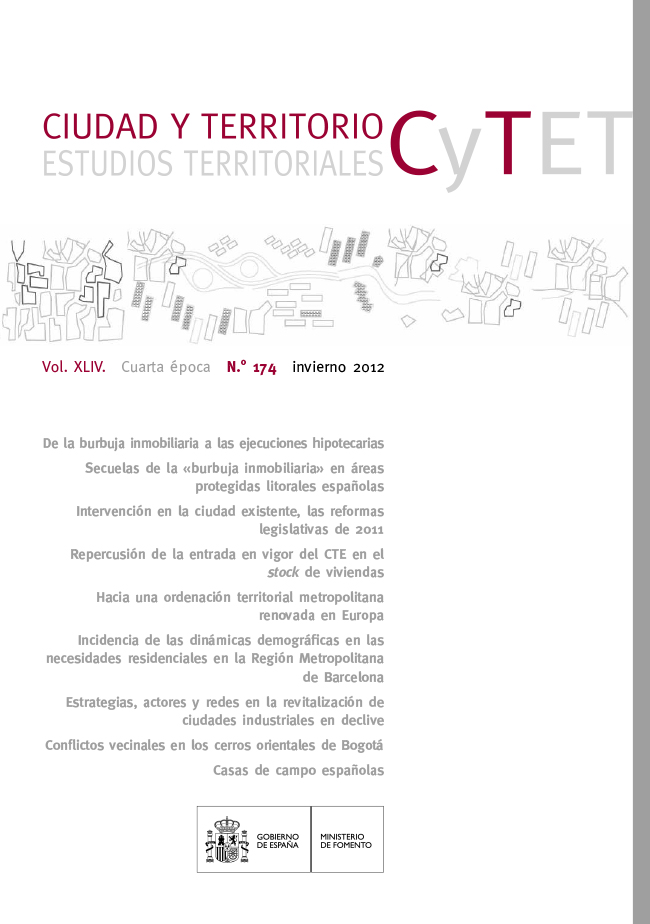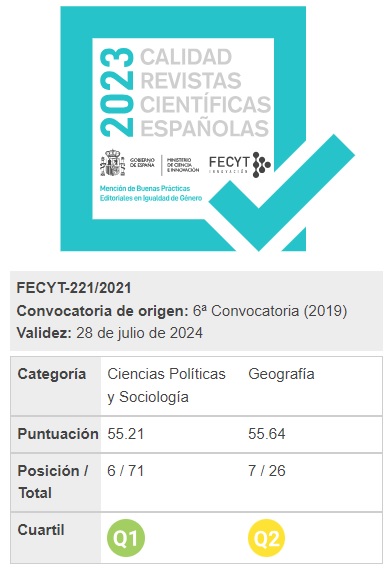Towards a Renewed Metropolitan Spatial Planning in Europe: The Plans of the, Paris, London, Berlin and Rome, Urban Regions
Keywords:
Urbanismo comparado, ordenación del territorio, planificación metropolitana, región urbanaAbstract
Large urban regions, capitals of the major European states, have recently developed spatial
planning instruments to face the challenges of managing post-metropolitan spaces with structures
and processes increasingly complex. They cover topics such as local-regional development and its
relationship with the World Cities for a Global Economy Network. Also social challenges are
approached from the quality of life, public safety and social cohesion. Environmental issues are
integrated in speeches such as climate change, energy savings or emissions reductions, often
translated by the design of new public transport networks, which in turn, serve to structure the new
settlements and to re-densify the existing. Finally, a set of more specific spatial strategies as
-containing the sprawl, organization of polycentrism, urban renewal, etc. Are set to address the
management of existing metropolitan dynamics.
Downloads
Downloads
Published
How to Cite
Issue
Section
License
Copyright (c) 2012 Rafael De Miguel González, José María Ezquiaga Domínguez

This work is licensed under a Creative Commons Attribution-NonCommercial-NoDerivatives 4.0 International License.
Considering the provisions of the current legislation on Intellectual Property, and in accordance with them, all authors publishing in CyTET give -in a non-exclusive way and without time limit- to the Ministry of Transport, Mobility and Urban Agenda the rights to disseminate, reproduce, communicate and distribute in any current or future format, on paper or electronic, the original or derived version of their work under a Creative Commons Attribution-NonCommercial-NoDerivative 4.0 license International (CC BY-NC-ND 4.0), as well as to include or assign to third parties the inclusion of its content in national and international indexes, repositories and databases, with reference and recognition in any case of its authorship.
In addition, when sending the work, the author(s) declares that it is an original work in which the sources that have been used are recognized, committing to respect the scientific evidence, to no longer modify the original data and to verify or refute its hypothesis. Author(s) also declare that the essential content of the work has not been previously published nor will it be published in any other publication while it is under evaluation by CyTET; and that it has not been simultaneously sent to another journal.
Authors must sign a Transfer of Rights Form, which will be sent to them from the CyTET Secretariat once the article is accepted for publication.
With the aim of promoting the dissemination of knowledge, CyTET joins the Open Journal Access (OA) movement and delivers all of its content to various national and international indexes, repositories and databases under this protocol; therefore, the submission of a work to be published in the journal presupposes the explicit acceptance by the author of this distribution method.
Authors are encouraged to reproduce and host their work published in CyTET in institutional repositories, web pages, etc. with the intention of contributing to the improvement of the transfer of knowledge and the citation of said works.








 Enlace a CyTET en Linkedin
Enlace a CyTET en Linkedin